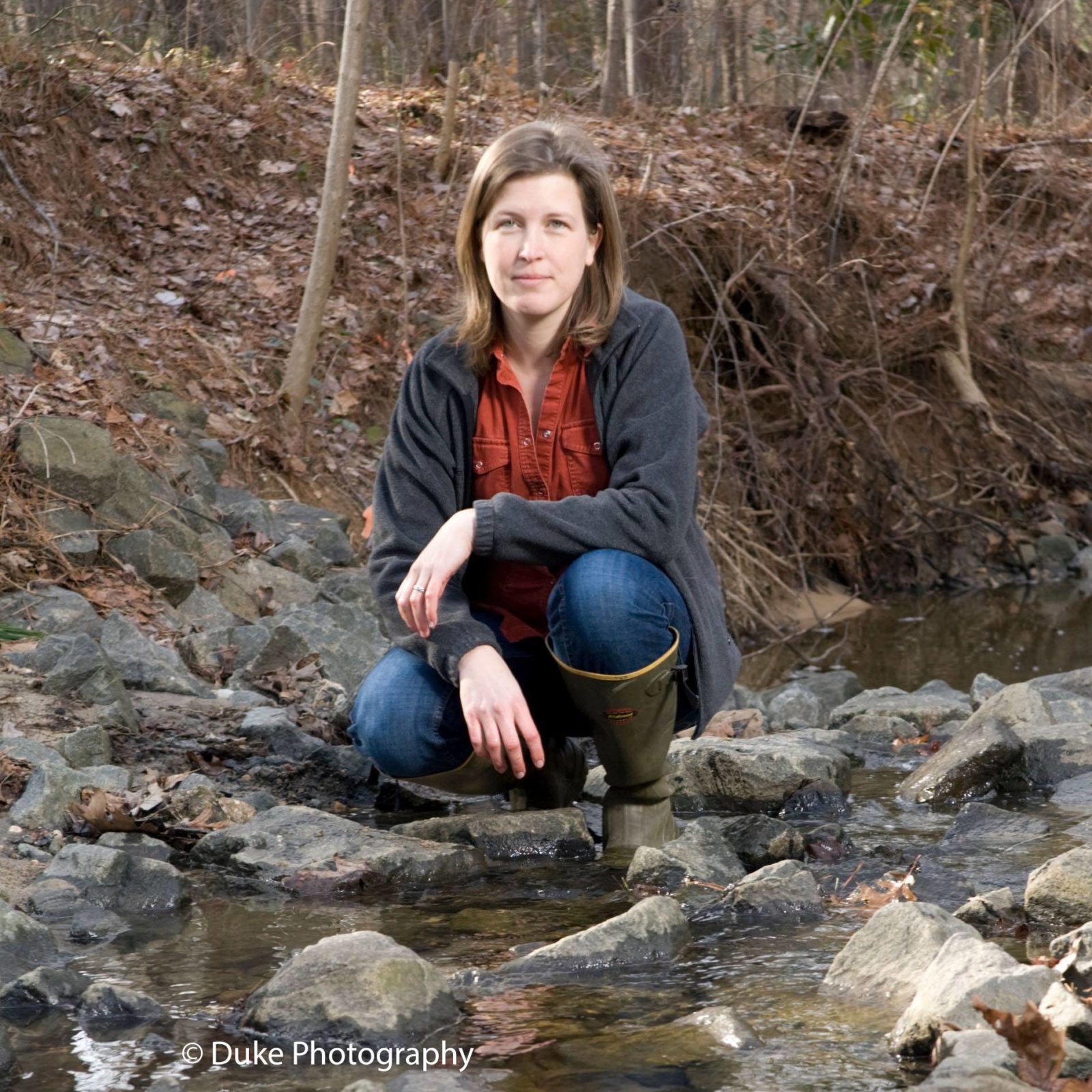March 7, 2019
Athens, Ga. – Emily Bernhardt, the Jerry G. and Patricia Crawford Hubbard Professor of Biology in the Nicholas School of the Environment at Duke University, will deliver the thirty-fourth annual Odum Lecture at the University of Georgia Odum School of Ecology. Her talk, “Do rivers have rhythm? Taking the pulse of freshwater ecosystems,” will take place at 3:30 p.m. on Tuesday, March 19 in the Odum School auditorium. It will be followed by a reception, and is free and open to the public.
Bernhardt is an ecosystem ecologist and biogeochemist focused on how human activities alter the structure and function of aquatic ecosystems. Her research includes studying the effects of saltwater intrusion on the ecosystems and communities of the North Carolina coast; how development influences the way stormwater and the contaminants it carries affect urban streams; and the environmental impacts of mountaintop removal mining in the Appalachians.
The subject of her talk is the StreamPULSE project, which focuses on how the rates and patterns of stream metabolism vary within and across streams. Funded by a macrosystems grant from the National Science Foundation for which she serves as lead principal investigator, the StreamPULSE project is a collaboration among scientists from seven universities and the U.S. Geological Survey. It includes study sites from New England to Puerto Rico, as well as Wisconsin and Arizona. The goal of the project is to measure and analyze concentrations of oxygen and carbon dioxide in these streams over daily, seasonal and annual scales to understand the patterns of their pulses across space and time.
Bernhardt is an elected Fellow of the Ecological Society of America. She is the recipient of a CAREER Award for New Investigators from the NSF, and served as president of the Society for Freshwater Science from 2016-2017. She is the author, with previous Odum Lecturer William Schlesinger, of Biogeochemistry: An analysis of global change, and has published more than 150 peer-reviewed papers.
“Professor Bernhardt’s work is extraordinary, showing that ecosystems are the heartbeat of how and why climate change is profoundly altering our ecological world,” said John Gittleman, UGA Foundation Professor in Ecology and dean of the Odum School. “It is an honor to host Professor Bernhardt to deliver the prestigious Odum Lecture.”
Honoring the founder of the Odum School of Ecology, the annual Eugene P. Odum Lecture Series features speakers who address significant ecological questions in broad social and intellectual contexts.
Odum Lecture Series, 1985-2018
2018: Hopi Hoekstra, Harvard University. From the field to the lab and back again: The genetic basis of adaptation
2017: Iain D. Couzin, University of Konstanz and Max Planck Institute for Ornithology. Collective Sensing and Decision-Making in Animal Groups: From Fish Schools to Primate Societies
2016: Jonathan Levine, ETH Zürich. Understanding species’ responses to climate change: The need for population and community ecology
2015: Nancy Grimm, Arizona State University. The Only Certainty Is Change: Reflections on a Stream, a City, and a Public University
2014: Marlene Zuk, University of Minnesota. Rapid Evolution in Silence: Adaptive Signal Loss in the Pacific Field Cricket
2013: Mary Power, University of California, Berkeley. Food Webs in River Networks: Algal-mediated Linkages of Rivers, Uplands and Oceans
2012: Thomas W. Schoener, University of California, Davis. Evolution + Ecology = EvoEco: The Interplay of Evolutionary and Ecological Dynamics
2011: Stephen Pacala, Princeton Environmental Institute. From Basic Botany to Global Climate Change
2010: William Schlesinger, Cary Institute of Ecosystem Studies. Better Living Through Biogeochemistry
2009: Gretchen Daily, Stanford University. Ecosystem Services in Decision Making
2008: James Brown, University of New Mexico. Toward a Metabolic Theory of Ecology
2007: Stephen Carpenter, University of Wisconsin. Ecology for Transformation
2006: William Sutherland, University of East Anglia, Norwich, England. Predicting the Ecological Impact of Environmental Change
2005: No lecture
2004: Pamela Matson, Stanford University. Agriculture and Environment in the Yaqui Valley, Mexico: Does Intensification Save Land for Nature?
2003: Bryan Grenfell, University of Cambridge. Infectious Disease in Space and Time
2002: Peter Raven, Missouri Botanical Gardens. Biodiversity, Extinction, and Sustainability
2001: Gordon Orians, University of Washington. From Micro to Macro in Ecology: Insights from Australia
2000: Andrew Dobson, Princeton University. Unifying Nature’s Whipping Post: The Role of Infectious Diseases in Natural Populations, Communities, and Ecosystems
1999: Theo Colborn, World Wildlife Fund, Washington DC. Endocrine Disrupters and the Web of Life
1998: William Mitsch, Ohio State University. Designing with the Energy Flow: The Ecological Aproach to Engineering
1997: Lynn Margulis, University of Massachusetts. Gaia: The Wonderful Place with the Pox
1996: William Murdoch, University of California, Santa Barbara. Using Ecology to Solve Environmental Problems: Technical and Institutional Challenges
1995: Stephen Hubbell, Princeton University. Why Do We Need a National Institute for the Environment?
1994: Herman Daly, University of Maryland. Environmentalists’ Farewell to the World Bank
1993: Norman Myers, Headington, Oxford, United Kingdom. Tropical Forests: Their Future and Our Future
1992: Hank Shugart, University of Virginia. Using Ecosystem Models to Assess Potential Consequences of Global Climate Change
1991: William Clark, Harvard University. Sustainable Development of the Biosphere: Managing the Intersections Between the World Economy and the Global Environment
1990: Thomas Lovejoy, Smithsonian Institution. The Environment: Decade of Decision
1989: Bert Bolin, International Institute of Meteorology and University of Stockholm. Greenhouse Gases and Climate Change: What Do We Know and What Do We Do?
1988: David Sloan Wilson, Michigan State University. Reviving the Superorganism
1987: John Harper, University of North Wales. A Reductionist in an Ecosystem
1986: Rita Colwell, University of Maryland. Environmental Aspects of Research in Biotechnology
1985: David Coleman, UGA. From Genetics to Gaia: Toward an Appropriate Biotechnology
The Odum Lecture Series has been supported in part by the Eugene P. and William E. Odum Endowment.

